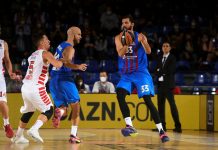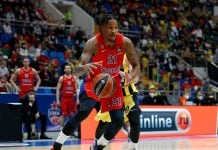For a number of reasons it was supposed to be an extraordinary Thursday. CSKA couldn’t have picked a better night to honor its three living legends: the first sellout of the season and one of Europe’s strongest teams on the other end of the floor fit the occasion perfectly.
As 1972 Olympic champions Alzhan Zharmukhamedov, Ivan Edeshko and Sergei Belov stepped on the court at halftime to see their jerseys hoisted to the rafters of the Alexander Gomelsky Universal Sports Hall, the crowd rose and drowned their words in applause.
“When you look at those jerseys, I don’t want you to see just a piece of fabric, but the men who gave the best years of their lives to the game and this great club – CSKA,” an emotional Belov told fans.
At the end of the day, though, it was a sad finale for the local crowd. Xavi Pascual’s Barcelona routed CSKA by a 21-point margin, but something hurt the hosts more than the numbers flashing on the scoreboard. In the key moments of the game last season’s Euroleague finalist lacked character and heart – the very things any head coach hates to see missing in his team. Ettore Messina was no exception.
“We missed easy shots, got frustrated for not scoring, but these are just excuses. We all know it is not acceptable to give up and unfortunately this is what we did – we gave up. We need to apologize to our fans, our club, go to work harder than the day before and find out what we’re made of,” Messina told reporters at the postgame press conference.
At the Friday meeting with his team to break down film documenting the previous night’s disaster, Messina surely didn’t need a DVD player – the man so devoted to his job memorizes every detail of the game better than a piece of electronic equipment. But that talk wasn’t going to be about unnecessary turnovers, missed shots and slow ball movement. The focal point of that discussion would have been attitude, and it was evident that the coach would insist on the kind of reaction that rules out waving a white flag even when you’re 20 points down.
Paraphrasing Belov, the players would have to show they’re determined to give their best EVERY night they step on the floor, not just SOME nights.
“Last week, after the game with Besiktas we felt that we made a big step forward in terms of team chemistry and playing together. Today we bounced back a lot. When things became hard and difficult, we didn’t show chemistry, didn’t know who to follow and this was very worrying. So I don’t know where we are – I felt the chemistry was really growing last week and now it looks we’re back to zero, right there where we started,” Messina said after Thursday’s game.
Looking for Leaders
The four-time Euroleague winner knows that great teams are built around great leaders. In CSKA’s heyday during Messina’s first stint in Moscow in 2005-2009 there were plenty. Teo Papaloukas, David Vanterpool, J.R. Holden, Matjaz Smodis, Trajan Langdon, David Andersen, Ramunas Siskauskas, Viktor Khryapa never shied away from taking responsibility and led by example. And their teammates followed suit.
Asked if mental toughness can be coached, Messina replied: “There must be [a way]. If not, we’re facing a very difficult season. It’s something we have to do obviously with the help of some leaders in the team, you cannot do it by yourself. This has been the history of all the great CSKA teams – there was always an input from the bench and a big input by some important leaders on the floor. It’s the kind of work that you do together.”
Today, CSKA is soulsearching, trying to identify players able to fill those shoes and bring the team back to the summit of Europe, which it conquered twice during Messina’s previous reign.
Putting together a squad capable of repeating those feats won’t be easy with only four players – Khryapa, Kaun, Vorontsevich and Ponkrashov – who earlier played under the Italian.
Khryapa can still lead – and he does – but he can’t do it all alone. In a team packed with talent other players need to step up and help the captain. Is it going to be Milos Teodosic, CSKA’s exceptionally gifted playmaker still hunting his first major European title? Or Nenad Krstic, one of the best European centers who several years ago shone in the NBA, too? Or Sonny Weems, almost unbeatable in one-on-one encounters and able to turn games around individually? Or Vladimir Micov, an intelligent, versatile forward and a smart reader of the game? Or Aaron Jackson, a formidable slasher who ripped every Euroleague opponent’s defense last season, including CSKA’s?
So far, each of them has been displaying only flashes of brilliance, often followed by mediocre performances. Inconsistency is CSKA’s major foe, which is not surprising for a team that completed its roster just a month and a half ago.
In Rebuilding Mode, Again
On Sept. 22 Messina gathered a full squad for the first time since taking over in June as six-time European champions defeated hosts FC Bayern in a preseason friendly on the floor of Munich’s Audi Dome arena. With half a dozen newcomers and a long past season that for some players ended only after wrapping up EuroBasket 2013 qualifiers, the Italian tactician had just about 20 days to fine-tune the team ahead of its Oct. 11 Euroleague premiere.
Too little to straighten out disbalance in physical shape of his players, let alone to have them fully absorb his philosophy of basketball, with team-first mentality, tough, relentless defense and excellent ball control as its main pillars.
Messina’s trademark ability to assign a fitting role to every player in his system earned him the reputation of one of the game’s best system builders who only needs one ally – time. The change of format in the Top 16 phase will also do his team good – 14 games instead of six will reduce the weight of potential failure in a single game and allow the Italian to tweak tactics. But this time the challenge is a lot bigger than in 2005 as CSKA starts almost from scratch en route to building a new, powerful squad.
Following a season which could have been magnificent, but was instead labeled just very good after Olympiacos forward Giorgos Printezis’ last-ditch basket snatched European title under CSKA’s nose in the May 13 final in Istanbul, Russian champs are again in rebuilding mode. Former head coach Jonas Kazlauskas was released at the end of the 2011/12 campaign despite clinching two trophies (domestic title and VTB league crown) and the Euroleague final. In stark contrast to the 2002-2009 era that saw only one change at the helm (Messina taking over from Dusan Ivkovic seven years ago), the 57-year-old Lithuanian’s firing in June meant that the fifth coaching appointment in just three years was inevitable. Messina’s return to the club was met with a lot of fanfare in Moscow with memories of his past success with the team as vivid as ever. CSKA’s front office had a busy summer as it radically revamped the roster that currently features six newcomers. Superstar Andrei Kirilenko is gone, as is his old/new teammate Alexei Shved who rejoined the lanky forward in Minneapolis. Ramunas Siskauskas retired, and the club parted ways with Jamont Gordon, Sammi Mejia and Darjus Lavrinovic.
Meanwhile, Messina in preseason focused on shaping a squad that at one time or another during the summer had key performers defending national team colors at the London Olympics and in Eurobasket 2013 qualifiers. With all the pieces finally in place, he started building. Six years ago he emerged victorious in his debut season. This time it could take longer, but the wait is worthwhile. Whoever rushes him apparently has a very short memory – before the historic success in Prague in 2006, CSKA’s European title drought lasted 35 long years. The new trophy will surely arrive in Moscow quicker than that. All it takes is patience. Patience and time.















